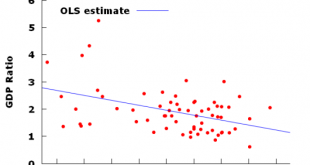Axel Leijonhufvud – 1973 The Econ tribe occupies a vast territory in the far North. Their land appears bleak and dismal to the outsider, and travelling through it makes for rough sledding; but the Econ, through a long period of adaptation, have learned to wrest a living of sorts from it. They are not without some genuine and sometimes even fierce attachment to their ancestral grounds, and their young are brought up to feel contempt for the softer living in the warmer lands of their...
Read More »The Rise and Fall of Debate in Economics
The Rise and Fall of Debate in Economicsjoseph a. francis New data illustrate the extent to which economists have stopped discussing each other’s work. Once upon a time, economists regularly used to publicly criticise each other’s work in academic journals. But not any more. read more
Read More »Open thread May 21, 2021
Does size matter?
from Lars Syll Economic growth has since long interested economists. Not least, the question of which factors are behind high growth rates has been in focus. The factors usually pointed at are mainly economic, social and political variables. In an interesting study from the University of Helsinki, Tatu Westling has expanded the potential causal variables to also include biological and sexual variables. In the report Male Organ and Economic Growth: Does Size Matter, he has — based on the...
Read More »«Το σύγχρονο πανεπιστήμιο στην υπηρεσία του κεφαλαίου – Η μάχη για την παιδεία των αναγκών μας» – Παρασκευή 21/5/2021, 18:00, Πλατεία Πρωτομαγιάς
Την Παρασκευή (21/5/2021, 18:00, κάτω Πολυτεχνείο) η νεολαία Κομμουνιστική Απελευθέρωση διοργανώνει εκδήλωση με θέμα «Το σύγχρονο πανεπιστήμιο στην υπηρεσία του κεφαλαίου – Η μάχη για την παιδεία των αναγκών μας», στην οποία θα συμμετάσχω σαν ομιλητής Η άποψη μου για το Επιχειρηματικό Πανεπιστήμιο είναι διατυπωμένη σε αρκετές δημοσιεύσεις όπως οι ακόλουθες (με τους διαθέσιμους διαδικτυακούς συνδέσμους): Μαυρουδέας Στ. (2005), «Οι τρεις εποχές του πανεπιστημίου – Το...
Read More »Μαυρουδέας Στ. (2005), «Οι τρεις εποχές του πανεπιστημίου – Το πανεπιστήμιο στον καπιταλισμό», Ελληνικά Γράμματα.
Το πόνημα «Οι τρεις εποχές του πανεπιστημίου – Το πανεπιστήμιο στον καπιταλισμό» εκδόθηκε το 2005, σε μία περίοδο όπου ενώ το πανεπιστήμιο στην Ελλάδα άλλαζε ραγδαία (ακολουθώντας τον δρόμο που είχε ήδη διανύσει στις πιο αναπτυγμένες καπιταλιστικές κοινωνίες) η σχετική συζήτηση στην Ελλάδα ήταν επιεικώς υπανάπτυκτη και αγκυλωμένη σε ήδη ξεπερασμένα στοιχεία της μεταπολιτευτικής περιόδου. Η κεντρική θέση του πονήματος ήταν ότι το πανεπιστήμιο (που αποτελεί ένα θεσμό γέννημα της...
Read More »Next WEA webinar: TRADE WARS AFTER CORONAVIRUS
TRADE WARS AFTER CORONAVIRUSEconomic, political and theoretical implications A webinar from the WEA Friday May 28, 2021. 5pm-7pm, London Time. LINK: meet.google.com/nxr-ucuj-agf 1. WELCOME. Maria Alejandra Madi, Chair WEA Conference Programme 2. PRESENTATIONS America’s Trade Deficits: Blame U.S. Policies – Starting with Tax Laws Kenneth E. Austin University of Maryland The interplays of US, China and their intellectual monopolies Cecilia Rikap and Ariel Slipak Cecilia Rikap:...
Read More »Grading the U.S. response to the pandemic
How should we grade our collective response to the covid pandemic? What lessons should we draw for the future? I believe that our response was poor. To see why, just imagine where we would be today if effective vaccines had not been developed. Our current strategy of moderate social distancing, intermittent partial lockdowns, and economic assistance for businesses and the unemployed would not have been sustainable for another 1 or 2 years as...
Read More »Ayn Rand — one of history’s biggest psychopaths
from Lars Syll Now, I don’t care to discuss the alleged complaints American Indians have against this country. I believe, with good reason, the most unsympathetic Hollywood portrayal of Indians and what they did to the white man. They had no right to a country merely because they were born here and then acted like savages. The white man did not conquer this country … Since the Indians did not have the concept of property or property rights—they didn’t have a settled society, they had...
Read More »Population growth and the which way is up problem in economics
from Dean Baker Paul Krugman’s column today commented on the recent data showing continuing low fertility rates, which is likely to mean a stagnant or declining working age population in future years. Krugman points out that this is no big deal; Japan and Europe have been living with declining working age populations and have managed just fine. But he does point out that a declining working age population is likely to lead to lower rates of investment and therefore creates a risk of...
Read More » Heterodox
Heterodox




